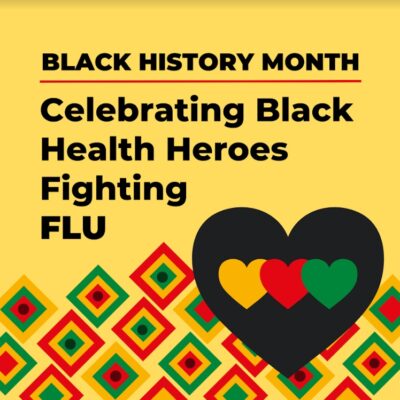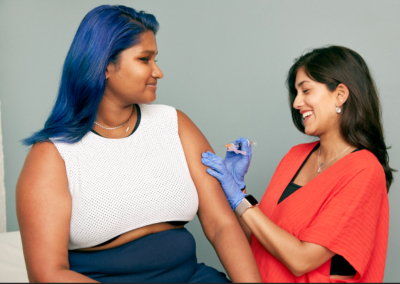- Expert Commentary
From the Experts: Taking Control of Flu Season

The following article is cross-posted with AstraZeneca’s AZ&You US Blog.
It’s safe to say that staying healthy and protected has been more top of mind than ever over the past year and a half. Yet even though we’ve been through one influenza (flu) season during the pandemic, unknowns around the interplay of these two viruses remain unique to each season. The good news is, there’s one decision that can always be made with confidence and clarity: getting your annual flu vaccine to help keep yourself and those around you protected from preventable illness.
Our dedication to protecting the public’s health remains unwavering since it is at the core of what we do. We are proud to play our part again this year by diving back into flu prevention and discussing what families need to know to stay healthy this flu season. Allyn Bandell, AstraZeneca’s Senior Influenza Global Medical Lead, connected with Shelle Allen, President of Families Fighting Flu (FFF) and Marla Dalton, CAE, Executive Director & CEO of the National Foundation for Infectious Diseases (NFID) to discuss how to protect yourself and your families this flu season.
Allyn: How can individuals best prepare themselves and their families against flu amid another season of COVID-19 overlap?
Shelle Allen, FFF: The most important thing families can do to prepare for the flu season is to understand the importance of flu vaccinations. Annual flu vaccination is the best preventative measure you can take to protect yourself and your family from the flu. We encourage people to facilitate conversations with their trusted healthcare providers. Ask questions that concern you and your family regarding the flu as well as the ongoing COVID-19 pandemic. Alternatively, we also suggest reaching out to your local pharmacist or health department to receive reliable, scientific and evidence-based information.

Marla Dalton, NFID: The most important thing we all can do to help protect ourselves, our families, and our communities from both flu and COVID-19 is to get vaccinated. Vaccination also helps to protect children, older adults (65+), and those with certain chronic health conditions who are most vulnerable to flu and related complications. A recent national NFID survey found that 44 percent of US adults said they are unsure or do not plan to get vaccinated this season, despite the fact that 61 percent agreed that flu vaccination is the best preventive measure against flu-related deaths and hospitalizations. The survey findings highlight the importance of raising awareness and addressing misconceptions about flu, and the importance of healthcare professionals strongly recommending vaccination for their patients.
Allyn: We saw record-breaking low circulation of flu last year, likely due to COVID-19 health precautions (e.g., mask-wearing, social distancing). What does this mean for this year’s flu season and how do we prepare?
Shelle: At Families Fighting Flu, we are very concerned that the public may now have reduced immunity against the flu because of last year’s historically low number of flu cases. During this unpredictable respiratory season, we want to remind everyone that “it’s not JUST the flu” – it’s a serious disease. Flu symptoms can be very similar to COVID-19 symptoms, which emphasizes the need to be vaccinated for BOTH diseases and to ask to be tested for the flu and COVID-19 when symptoms present. Remember, the flu does not discriminate. Protection against the flu is just as important this year as years past, perhaps even more so!
Marla: Flu is notoriously unpredictable. While flu activity was historically low during the 2020-2021 flu season due to COVID-19 mitigation strategies, including social distancing and masking, we now must prepare for the worst and hope for the best. The US could face a potentially vigorous respiratory virus season because of relaxed COVID-19 precautions, increased travel, children returning to school, and employees returning to offices.
While it is impossible to predict what will happen during the 2021-2022 flu season, getting a flu vaccine is more important than ever and offers the best protection against flu and its related complications. Even in cases when flu vaccination does not completely prevent infection, it can reduce the likelihood of serious complications, including hospitalization and death.
Allyn: With schools having returned in-person and COVID-19 precautions continuously changing, how can parents help their kids stay protected this year?
Shelle: First and foremost, we task all parents to protect themselves and their children by getting their flu vaccine this season. We’re all doing our best to navigate the school year with a great deal of uncertainty about what to expect in the months ahead. That’s why it’s more important than ever to protect our children, our schools, and our communities by getting vaccinated and removing flu from this unpredictable respiratory season. In addition to getting a flu vaccine, individuals should take preventative measures to help fight flu: stay home if you are sick, practice healthy habits such as washing your hands, covering your coughs and sneezes, avoid touching your eyes, nose, or mouth, clean and disinfect surfaces or objects. We encourage the public to wear a mask, social distance as much as possible and if you have flu-like symptoms call a healthcare provider as soon as possible.
Marla: Social distancing and proper handwashing can help reduce the spread of flu and COVID-19, but vaccination is still the best way to protect against both diseases. Everyone in the family who is eligible should be vaccinated against both flu and COVID-19. CDC guidance indicates that both vaccines can be given during the same visit.
In addition to getting vaccinated, families should take everyday preventive actions to help #FightFlu. Stay home if you are sick, practice healthy habits such as washing your hands properly and covering your coughs and sneezes, and when you go out, wear a mask. However, if you develop flu symptoms, call a healthcare professional as soon as possible and take flu antivirals if prescribed.
+++
The Centers for Disease Control and Prevention (CDC) has issued several statements on how to best prepare for the 2021-2022 influenza season, stressing the importance of vaccination to help protect the public from the risk of co-infection with COVID-19. Yet, according to recent 2021 data from the CDC, vaccination among children was over 4 percent less than that of 2020, plus coverage was almost 13 percent lower among non-Hispanic Black children compared to non-Hispanic White children.
Despite disparities among populations, there are several vaccine options available, even for those who prefer a needle-free option. The CDC does not recommend one flu vaccine over another, but it’s important to speak to your healthcare provider to find out which vaccine is right for you.
Everyone should feel empowered to receive their annual flu vaccine to keep themselves and their loved ones healthy. For more information on where to find a nearby flu vaccine option, please visit vaccine finder.


